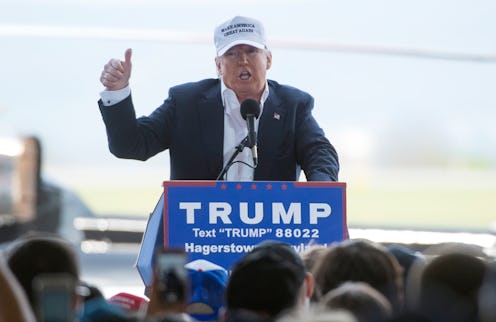News
The Total Tuesday Delegate Count Is Crucial
Well, it's all over, folks. The vaunted Acela primaries — if that's what you want to call them — have come to an end, and just as the polls predicted heading in, it was a very strong night for the two frontrunners. In other words, if you're wondering who won the most delegates on Tuesday, you're not in for much of a shock: Donald Trump and Hillary Clinton carried the night, and things are looking increasingly dim and desperate for their competitors.
To be clear, while Clinton had a strong night and virtually eliminated any realistic path for her chief rival Bernie Sanders to win the nomination, it wasn't half as dominant a performance as Trump turned in on the Republican side. The billionaire businessman swept all five states — Connecticut, Maryland, Rhode Island, Delaware, and Pennsylvania — by absolutely staggering margins, while Clinton won four out of the five states on the schedule, and the biggest ones to boot.
But simply winning states isn't the name of the game, winning pledged delegates is. And the results are very good news for both candidates in that department, too — Clinton has widened her lead over Sanders, establishing herself as a virtual lock for the nomination, and Trump has made his pathway to a 1,237 delegate majority (and thus the GOP nomination) that much clearer.
Here's the situation: Trump has secured 105 out of the 118 pledged delegates on offer. It's impossible to peg his total number just now, as his delegates in Pennsylvania won't be clear for a while — the state only awards 17 pledged delegates, allowing the other 54 to make up their own minds — but it was precisely the sort of undeniable, overwhelming victory he was looking for.
What does this mean for the final tally? Obviously, both Trump and Clinton have widened their leads. Heading into voting on Tuesday, Trump was leading the field with 844 delegates, and now, he's moved on up to 953. Clinton, on the other hand, was leading Sanders at 1,446 pledged delegates, and now she's surged up to at least 1,650.
And with increasingly few opportunities left on the respective schedules — both Cruz and Kasich have been mathematically eliminated unless there's a contested convention, while Sanders' hopes are all but over — let's just say that the drama is rapidly draining out of these contests. The cake has already been baked, so to speak. That doesn't mean the primaries are over and done with, though, as the people of Indiana will be heading to the polls on May 3, in what Republican challenger Ted Cruz is setting up as his last stand.
